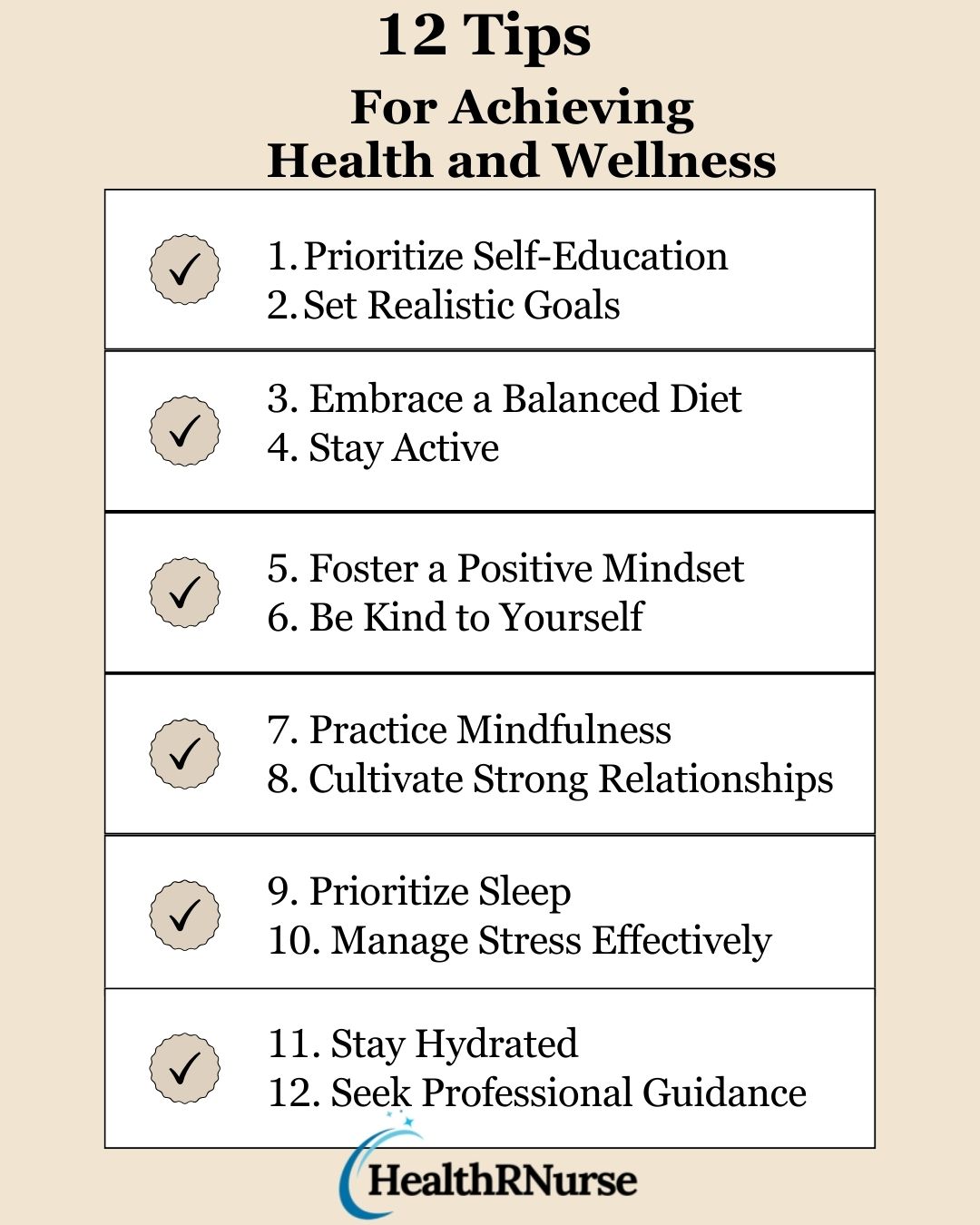
12 Tips for Achieving Health and Wellness
1. Prioritize Self-Education
The foundation of a healthier life begins with self-education. Take the time to learn about nutrition, exercise, mental health, and overall well-being. By staying informed and continuously seeking knowledge in these areas, you empower yourself to make informed choices about your lifestyle. Being well-informed will assist you in make better decisions regarding your health. It allows you to distinguish between fact and myth, enabling you to adopt practices that genuinely benefit your health and well-being.
2. Set Realistic Goals
Setting realistic goals for your professional and personal life can help you stay motivated and focused. Break down larger objectives into smaller, achievable steps that you can work towards gradually. By setting realistic goals, you can prevent burnout and maintain a healthy work-life balance while pursuing your aspirations.
3. Embrace a Balanced Diet
Nutrition plays a vital role in supporting your physical and mental well-being. Ensure that you consume a balanced diet consisting of fruits, vegetables, lean proteins, and whole grains. Prioritize nutritious meals and snacks to fuel your body and mind, providing you with the energy and nutrients required to maintain health and wellness.
4. Stay Active
Regular physical activity is essential for maintaining your overall health and reducing the risk of chronic diseases. Incorporate exercise into your daily routine, whether it’s taking a brisk walk, practicing yoga, or engaging in strength training exercises. Find activities that you enjoy and make them a regular part of your self-care regimen.
5. Foster a Positive Mindset
Maintaining a positive mindset can help you navigate the challenges of your work as a home health clinician. Cultivate optimism, practice gratitude, and focus on solutions rather than dwelling on problems. A positive mindset can boost your resilience, enhance your job satisfaction, and improve your overall well-being. Here is more on the power of positive thinking: https://healthrnurse.com/the-power-of-positive-thinking/
6. Be Kind to Yourself
Above all, remember that the pursuit of good health and wellness is a lifelong journey, not a fixed destination. Be compassionate towards yourself and celebrate your achievements along the way. Acknowledge that setbacks are a natural part of the process and use them as opportunities for growth.
7. Practice Mindfulness
Incorporate mindfulness practices into your daily routine to reduce stress and enhance your well-being. Take moments throughout the day to pause, breathe deeply, and be fully present in the moment. Mindfulness techniques such as meditation, deep breathing, or progressive muscle relaxation can help you manage stress and cultivate a sense of calm amidst the demands of life.
8. Cultivate Strong Relationships
Healthy relationships provide emotional support, reduce stress, and foster a sense of belonging. Invest time in nurturing and maintaining meaningful connections with friends and family. Strong relationships have a profound impact on mental health and happiness. They also offer a safety net during challenging times.
9. Prioritize Sleep
Quality sleep is essential for your physical and mental health, as well as your ability to perform effectively as a home health clinician. Establish a relaxing bedtime routine and create a sleep-friendly environment conducive to restful sleep. Aim for seven to nine hours of sleep per night to ensure that you wake up feeling refreshed and rejuvenated.
10. Manage Stress Effectively
Stress is a part of life, but how you manage it matters. Practice stress-reduction techniques such as meditation, deep breathing, or hobbies that bring you joy. Chronic stress can lead to a range of health issues, including heart disease, digestive problems, and mental health disorders. Effective stress management is vital for overall well-being.
11. Stay Hydrated
Proper hydration is often underestimated but crucial for optimal bodily functions. Aim to drink enough water throughout the day to support overall health. Hydration aids digestion, circulation, temperature regulation, and cognitive function. It also helps maintain healthy skin and joints.
12. Seek Professional Guidance
Finally, recognize that seeking professional guidance is a sign of strength, not weakness. If you encounter health challenges or mental health issues, consult with healthcare providers or mental health professionals who can provide expert guidance and support. Professionals can offer personalized advice and treatments tailored to your specific needs. Early intervention can prevent health issues from worsening.
Conclusion:
Prioritizing self-care is essential for home health clinicians to maintain their health, well-being, and effectiveness in providing care to their patients. By incorporating these 12 tips into your self-care routine, you can enhance your overall health and happiness while fulfilling your personal and professional responsibilities with compassion and excellence.
Disclaimer:
The information provided in this article is intended for general informational purposes only and is not a substitute for professional medical advice, diagnosis, or treatment. Always seek the advice of your physician or other qualified healthcare provider with any questions or concerns you may have regarding your health or well-being.

